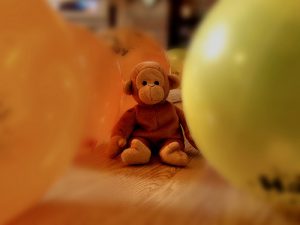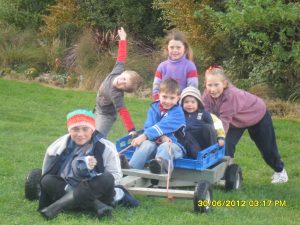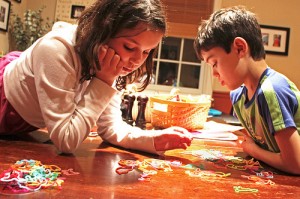
by World Moms Blog | Nov 25, 2013 | 2013, Body Image, Child Care, Childhood, Communication, Cultural Differences, Education, Eye on Culture, Family, Guest Post, Kids, Language, Life Balance, Motherhood, Parenting, Preschool, Relationships, School, Sex, Sexuality, Traditions, Uncategorized, Women's Rights, World Events, World Interviews, World Mom Feature, World Moms Blog, World Motherhood, Younger Children
 My neighbours in the Netherlands just had a baby and have proudly decorated their window with pink balloons and a garland saying: ”Hooray, a girl!”
My neighbours in the Netherlands just had a baby and have proudly decorated their window with pink balloons and a garland saying: ”Hooray, a girl!”
This would probably be shocking to a new category of Swedish parents, who refuse to reveal the sex of their baby to family and friends as well as to daycare staff. The baby is given a gender-neutral name, and will be dressed in anything but pink and light-blue.
Why? The parents don’t want their child to be subjected to society’s division of human beings into male and female, claiming that the stereotypes linked to it limit the child’s freedom.
While this remains rather rare, there is a rapidly increasing number of preschools in Sweden where gender equality is the main ideological and educational basis.
In these schools, the staff strives to treat girls and boys equally in all respects. They don’t hide the fact that both sexes exist, but don’t make a point of it and won’t encourage the children to play and behave in a way that is typical for their sex. They won’t call them girls and boys, but refer to them as ”friends” or ”children”.
Conveniently enough, a new pronoun is making its way into the Swedish language: ”hen”, meaning both ”he” and ”she” (”han” and ”hon” in Swedish). When the practice of using ”he” for both sexes in law texts was changed to the more cumbersome ”he or she”, texts became difficult to read and people started looking for other solutions.
The idea of ”hen” comes from the Finnish language (although Finnish is completely different from Swedish; its closest relative among European languages is Hungarian), which uses the pronoun ”hän” for both sexes. Apart from being used in texts to increase readability, the Swedish pronoun ”hen” is now used by advocates of gender neutrality.
The new pronoun and gender-neutral preschools are hot topics in Sweden right now. An increasing number of people like and make use of them, but a big part of the population is very critical towards them.
Sweden is one of the leading countries when it comes to gender equality. Thanks to the important work that has been done in this regard, women and men now basically have the same opportunities in all areas of life.
When gender equality turns into gender neutrality, however, are we still going in the right direction? Isn’t there a risk that gender-neutral treatment introduces another type of prejudice? When girls behave in a traditionally girly way, and boys behave in a traditionally boyish manner, will this be happily accepted or will they feel that their behaviour is wrong? Will there be a new ideal of tough girls and soft boys, as some critics fear?
How will children develop when their parents actively try to conceal what sex they are? Will they think that it’s bad to be a boy or a girl? Will they revolt against their upbringing and shower their own daughters with princess stuff, and their sons with cars and toy guns? Or will these children simply be freer and more unprejudiced than those who grow up in more traditional families, and contribute to a positive change in society?
Time will show.
What are you thoughts on this modern, Swedish approach to gender equality?
Kristina was born in Hamburg, Germany, but moved to Sweden at the age of 8 (her mother is German, her father Swedish). She studied French and linguistics and works as a translator. At the moment she lives in the Netherlands with her French husband and their two daughters, aged 17 months and 4 years. Kristina is interested in psychology and right now particularly focuses on child and family psychology. Working three days a week and being a full-time mom the remaining days, she doesn’t find as much time to read, write and practice yoga and music as she would like, but appreciates her early mornings in trains. There is nothing like contemplating an awakening landscape from a train with a cup of hot chocolate.
The image used in this post is credited to Jonathan Stonehouse. It holds a Flickr Creative Commons attribution license.
World Moms Blog is an award winning website which writes from over 30 countries on the topics of motherhood, culture, human rights and social good. Over 70 international contributors share their stories from around the globe, bonded by the common thread of motherhood and wanting a better world for their children.
World Moms Blog was listed by Forbes Woman as one of the "Best 100 Websites for Women 2012 & 2013" and also called a "must read" by the NY Times Motherlode in 2013. Our Senior Editor in India, Purnima Ramakrishnan, was awarded the BlogHer International Activist Award in 2013.
More Posts

by hjunderway | Nov 18, 2013 | 2013, Bilingual, Cultural Differences, Culture, Education, Expat Life, Eye on Culture, France, International, Living Abroad, Milestones, Motherhood, Moving, Preschool, Relocating, School, Stress, Traditions, USA, Working Mother, World Moms Blog, World Motherhood, Younger Children
 The day I gave birth to my son, HJ, is a day I’ll never forget. Induction nightmare? Check. Post baby snuggles? Check. September 3rd birth date? Check.
The day I gave birth to my son, HJ, is a day I’ll never forget. Induction nightmare? Check. Post baby snuggles? Check. September 3rd birth date? Check.
Little did I know at the time how much my son’s birthday would impact his development and education but flash forward to 2013 and here I sit, faced with the first of many educational concerns.
Living in Paris meant that on September 4th, 2012, my son formally entered the French education system. At just three years old, he was invited to attend nursery school, or maternelle, which comprises the first three years of schooling. Due to his inability to speak French, my son was invited to attend school four mornings per week from 8:30 a.m. until 11:40 a.m. As he began to thrive in school, his teacher gently suggested that I begin leaving him for one full-day per week after the holiday break in December. By late-January, he was attending school all day until 4:15 p.m., eating French catered lunch in the cantine (cafeteria), enjoying rest time, and thriving.
Combining his easy going attitude and tall stature (95% percentile for height), most parents thought my son was one of the older kids in the class. In order to start school in September, children must turn three by December 31st, and with a September 3rd birthday, my son was one of the younger students. When I would share this with the parents, they’d say, “Wow, but he is so tall!”
Our plans for HJ’s education were that he would be in French school until we moved home, and at that point he’d transition into kindergarten at the local school. When our contract ended sooner than expected, I began the joyous task of figuring out what options we had to continue HJ’s formal education, and the results were shocking.
HJ misses the US cut-off for kindergarten by two days. This means that he has to wait until he is six to enter kindergarten! I neatly placed that reality aside and instead focused on what education he could receive now, at four years old.
My choices floored me.
Option A) the public school offers a “lottery” for kids ages 3-4 for preschool, and the schedule only allows kids to get one of three spots: two mornings from 8-11, three mornings, four afternoons, or five mornings. And all this for the staggering price of more than $6,000.
Option B) the local Montessori school, which has no openings until September of 2014, and again runs mornings only. Did I mention that they also refused to reveal the actual cost of the program?
And finally, Option C) a local Catholic school that offers five all-day classes for around $7,000.
So what’s the big deal?!
Children in France have access to all-day education beginning at age three for FREE, with master’s degree trained teachers. While every school isn’t as amazing as the one my son attends, the French may be on to something. For two working parents, morning-only, formal education settings are an inconvenience, and for single-income families, shelling out over $6,000 for a few hours a day may be too much.
All around the United States, parents are struggling with making hard financial decisions and I wonder if it seems fair that we have to do so when it comes to our children’s educations?
For us, having HJ evaluated and exploring how he measures up to his peers is one solution. How he falls in the range of social and emotional intelligence will give us a window into how he may fair in kindergarten and will be necessary if we plan on fighting the school district for a spot in kindergarten if it seems logical and appropriate for our son.
The second option is to just ride the wave and instead allow our six year old to join his peers, perhaps giving him a leg up on his classmates. Then I question, “Will he be bored?” “Too big?” At this point I’m just not sure which choice is best for our little guy but it did get my wheels moving, wondering about the significant differences in how each country approaches education. What is it like for children in Germany, or Canada? Do parents struggle with similar issues in Sydney, Australia?
So please, World Moms Blog readers, share your location/country’s educational process! When does school begin? When did your children start school? Anything you wish you could change about your child’s educational experiences?
This is an original post to World Moms Blog from Jacki, mother of one now living in XXX but formerly blogging from Paris, France.
Jacki, or “MommaExpat,” as she’s known in the Internet community, is a former family therapist turned stay-at-home mom in Paris, France. Jacki is passionate about issues as they relate to mothers and children on both domestic and international scenes, and is a Volunteer Ambassador for the Fistula Foundation. In addition to training for her first half marathon, Jacki can be found learning French in Paris and researching her next big trip. Jacki blogs at H J Underway, a chronicle of her daily life as a non-French speaking mom in France.
More Posts

by Martine de Luna (Philippines) | Nov 14, 2013 | 2013, Cultural Differences, Humanitarian, Humanity, Natural Disaster, Philippines, World Events, World Motherhood
 There are just no words these days to describe what has happened to my beautiful country. I write this from the capital of Manila, which was spared the catastrophic effects of the world’s strongest recorded typhoon, Haiyan, which befell our country last November 8.
There are just no words these days to describe what has happened to my beautiful country. I write this from the capital of Manila, which was spared the catastrophic effects of the world’s strongest recorded typhoon, Haiyan, which befell our country last November 8.
The most affected regions are in the Southern region, the Visayas. These islands comprise some of our top tourist destinations, and are home to some of the world’s most beautiful beach landscapes, including the famous Boracay island, Bohol, and Palawan, where we have several world heritage churches and protected coral reefs.
Today, we don’t know what will come of these cities, which have all been ravaged by nature’s cruelest storm to date.
Watching CNN is both helpful and heartbreaking. Helpful, because it keeps us attuned to what’s going on; heartbreaking, because the images they show slowly wear away at the human heart. Daily — sometimes by the hour — we receive more news about the worsening situations in the Southern Philippines.
Our country is in shock. I know it would be easy for some to blame our government, too, and not that I am a hundred percent in agreement with the way things are run, but I also believe our President and officials of the affected cities are in shock, too. The finger-pointing and guilt-tripping on social media disgusts me, to the point that I’ve sometimes stayed off for hours, just to filter out the negativism. (more…)
Martine is a work-at-home Mom and passionate blogger. A former expat kid, she has a soft spot for international efforts, like WMB. While she's not blogging, she's busy making words awesome for her clients, who avail of her marketing writing, website writing, and blog consulting services. Martine now resides in busy, sunny Manila, the Philippines, with her husband, Ton, and toddler son, Vito Sebastian. You can find her blogging at DaintyMom.com.
More Posts

by Karyn Wills | Nov 4, 2013 | Being Thankful, Brothers, Childhood, Family, Family Travel, Friendship, Home, Inspirational, Kids, New Zealand, Older Children, Parenting, Relationships, Siblings, Traditions, Travel, Uncategorized, Vacationing, World Motherhood, Younger Children
 I have three sons and they are a lot of fun. They are also a lot of noise, mess and busyness.
I have three sons and they are a lot of fun. They are also a lot of noise, mess and busyness.
They adore one another most of the time and loathe one another at other times. Needless to say, living in a small house can get a little hectic and the fact that we live a car trip away from most of the boys’ friends—and I don’t always want to drive to fetch or deliver children—means that, from time to time, my boys can have a little too much of one another.
We are one small family and that can make us all tiresome to one another – no matter how strong the love between us.
The healthiness of living in an isolated, nuclear family unit has always bothered me a little. Not that living with my extended family or my in-laws would suit me, or them I suspect, either. But the cousins. Oh my goodness. The wonder of having cousins around – that appeals to me.
With cousins there is the common bond of grandparents and other family members, and the common history and the common family rituals. There is the emotional connection of knowing they all belong together, and the emotional connection of having been all together for their life times.
But, what I really love is the bond I see between our boys and all of their cousins in terms of visible affection and loyalty. When we have been away on holiday together, older cousins have often taken our boys off for adventures or have played with them, especially as babies and toddlers, so I could have a break. Younger cousins provide opportunities for my older boys to teach and help, in their turn. Sometimes it’s just fun to hang out together.
With their cousins, my boys are learning that things their brothers have said to them repeatedly, and they have ignored, are often the same opinions of others – and their cousins are not afraid to tell them so, sometimes bluntly. They are learning a higher level of co-operative skills and greater negotiation techniques, than they get to use with just two others. They are learning to walk away, when they need to walk away, and they are learning when it is appropriate to comment on another’s behaviour and when it is best to stay silent.
Like their brothers, their cousins love them. Unlike their brothers, their cousins are listened to. Like their friends, their cousins enjoy playing with them and will tell them to go away, when they‘ve had enough – but only for a short while. Unlike their friends, they cannot be transient members of their lives. And that last point, in particular, I love.
Do your children have good relationships with their cousins? Do you see a deeper bond between your children and their cousins, than with their friends?
Karyn is a teacher, writer and solo mother to three sons. She lives in the sunny wine region of Hawke’s Bay, New Zealand in the city of Napier.
More Posts

by Nihad | Oct 30, 2013 | 2013, Egypt, Family, Health, Holiday, Humanity, International, Life Balance, Life Lesson, Parenting, Uncategorized, World Motherhood
 Writing this post was the most challenging of all the posts I’ve ever written. You may not find it that valuable, but I will still go with writing and publishing it. Actually I wanted and needed to write, but I didn’t know what exactly I wanted to share it. My thoughts and my mind are a real mess.
Writing this post was the most challenging of all the posts I’ve ever written. You may not find it that valuable, but I will still go with writing and publishing it. Actually I wanted and needed to write, but I didn’t know what exactly I wanted to share it. My thoughts and my mind are a real mess.
Since the beginning of the 2013, life was really hard for me. First, I lost my father, and although I was accepting this fact and apparently I was calm, I was unaware that I was plunging into depression. It took me five months to realize it and accept the idea that I needed therapy. When I started to feel better, the situation in Egypt deteriorated, and we were under curfew for months. I was imprisoned at home and rarely went out. I lost interest in everything except the political talk shows, but later on I realized that was the main cause of my feeling down and fearful most of the time. I totally lost motivation to do anything and lost interest in anything. All I wanted was to stay still and silent for hours. (more…)

Nihad is an Egyptian woman, who was born and has lived her whole life in Alexandria, Egypt. She says, “People who visited this city know how charming and beautiful this city is. Although I love every city in Egypt, Alexandria is the one I love the most.”
She is a software engineer and has worked in the field for more than twenty years. But recently she quit her job, got a coaching certificate and she is now a self employed life and career coach. She says, “I believe that women in this era face big challenges and they are taking huge responsibilities. That's why I have chosen my niche -- women looking for happiness and satisfaction. I help and support them in making whatever change (career change, life change, behavior change, belief change…) they want to bring more satisfaction and happiness in their lives.”
Nihad is a mother of two lovely boys, 15 and 9 years old. She states, “They are the most precious gifts I have ever had. I madly love them, and I consider them the main source of happiness in my life.”
Our inspiring mother in Egypt can also be found at Aurora Beams Life Coaching.
More Posts

by Kyla P'an (Portugal) | Oct 25, 2013 | 2013, Being Thankful, Childhood, Communication, Domesticity, Education, Entertainment, Home, Humor, Kids, Life Lesson, Me-Time, Motherhood, Parenting, Relationships, School, Stress, Traditions, USA, World Motherhood, Younger Children
 Last week my 7-year-old daughter invited a friend over for a playdate after school. My daughter and this child aren’t close friends, in fact, they aren’t even in the same class at school but they did play on the same town soccer team last year and the child has invited my daughter over a few times—including to her 7th birthday party—so we were due to reciprocate.
Last week my 7-year-old daughter invited a friend over for a playdate after school. My daughter and this child aren’t close friends, in fact, they aren’t even in the same class at school but they did play on the same town soccer team last year and the child has invited my daughter over a few times—including to her 7th birthday party—so we were due to reciprocate.
This particular little girl comes from a family of four children. She lives nearby in a large house in a posh sub-division and with four kids in her home, they have a lot of toys and things to play with.
Furthermore, her mom is one of those Alpha moms, who runs various nominated volunteer positions at school and who always seems to have her stuff together: pressed and polished at morning drop-off and calm and controlled when you see her in the pick-up line at the end of the day. You know the sort. (more…)
Kyla was born in suburban Philadelphia but spent most of her time growing up in New England. She took her first big, solo-trip at age 14, when she traveled to visit a friend on a small Greek island. Since then, travels have included: three months on the European rails, three years studying and working in Japan, and nine months taking the slow route back from Japan to the US when she was done. In addition to her work as Managing Editor of World Moms Network, Kyla is a freelance writer, copy editor, recovering triathlete and occasional blogger. Until recently, she and her husband resided outside of Boston, Massachusetts, where they were raising two spunky kids, two frisky cats, a snail, a fish and a snake. They now live outside of Lisbon, Portugal with two spunky teens and three frisky cats. You can read more about Kyla’s outlook on the world and parenting on her personal blogs, Growing Muses And Muses Where We Go
More Posts - Website
Follow Me:


 My neighbours in the Netherlands just had a baby and have proudly decorated their window with pink balloons and a garland saying: ”Hooray, a girl!”
My neighbours in the Netherlands just had a baby and have proudly decorated their window with pink balloons and a garland saying: ”Hooray, a girl!”



 There are just no words these days to describe what has happened to my beautiful country. I write this from the capital of Manila, which was spared the catastrophic effects of the world’s strongest recorded typhoon, Haiyan, which befell our country last November 8.
There are just no words these days to describe what has happened to my beautiful country. I write this from the capital of Manila, which was spared the catastrophic effects of the world’s strongest recorded typhoon, Haiyan, which befell our country last November 8. 









